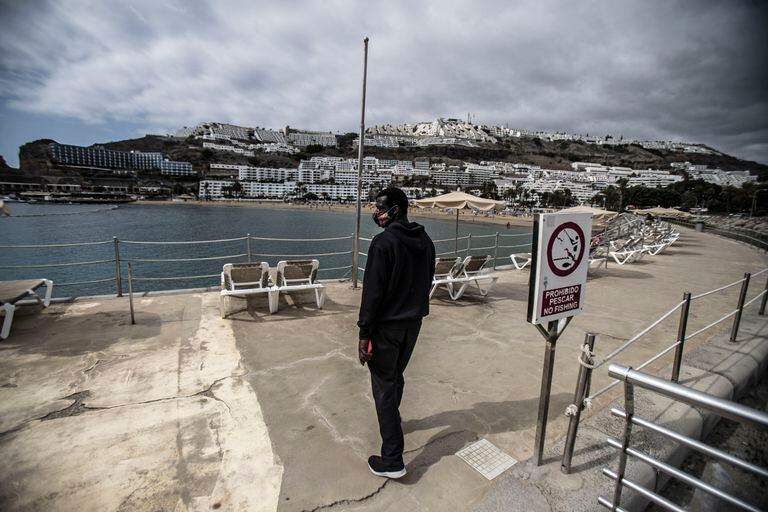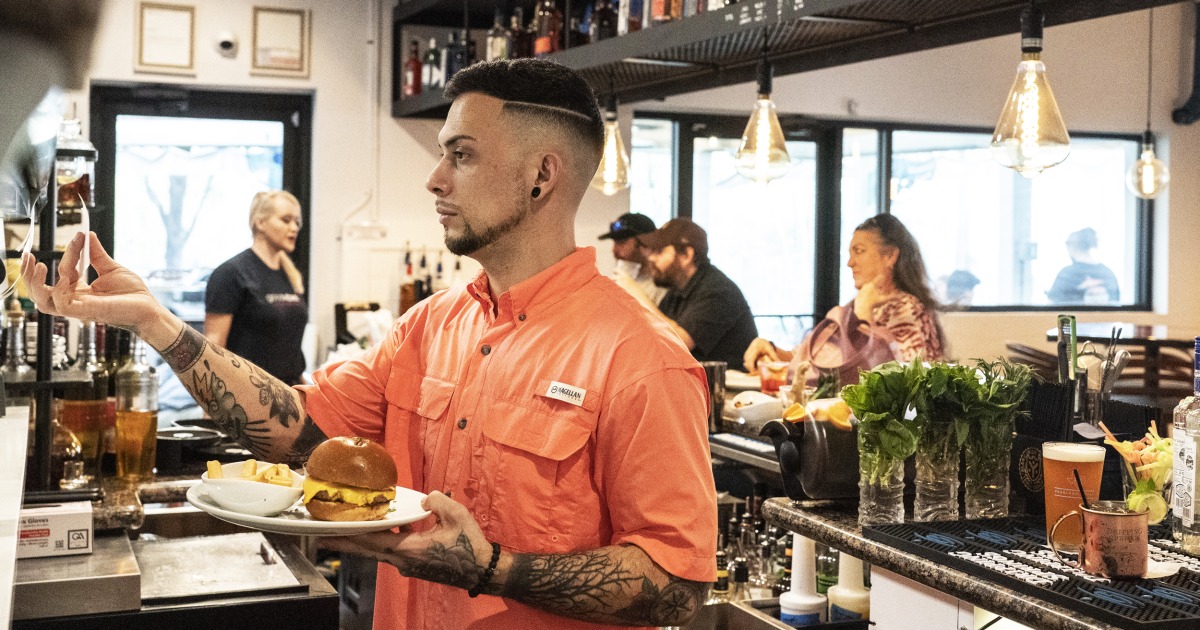Mohammed Gail, a Senegalese fisherman, on the breakwater of Puerto Rico beach, south of Gran Canaria.
Gala Sow was a happy man.
Lanky and awake, he moved deftly among the tourists who filled the streets of Saint Louis.
He ran a shop where he sold bracelets, necklaces, shoes and African costumes and gave courses and concerts of yembé, a popular drum in Senegal.
He had several friends who had emigrated to Europe in search of more opportunities, but he was living relatively well.
During the tourist season, from December to July, he could earn up to three million CFA francs, about 4,500 euros.
But from one day to the next, it was all over.
The pandemic imposed a curfew, blocked tourists in their countries and hit hard key sectors for the Senegalese economy such as tourism and fishing.
Single but with no more resources to support his mother and siblings, he sold a piece of land, grabbed his younger brother, and embarked on a fishing canoe with 66 other people.
A terrible 10-day journey to traverse the most dangerous sea route to Europe.
"All tourism workers, such as hoteliers, professional guides or merchants, we no longer had anything to live on," he recounts a month after landing in Tenerife.
A new profile of emigrant ruined by the coronavirus is arriving in the boats and canoes that disembark in the Canary Islands, surpassed by the entry of more than 11,000 people in the last 10 months.
Along with Malians fleeing the devastation of a state mired in conflict and migrants displaced by dictatorships, droughts or the chronic poverty of their countries, young and old who did not necessarily have in their plans to emigrate are throwing themselves into the sea.
They are fishermen, merchants, informal workers and the tourism sector who, with the confinements and the closing of borders, have been left with nothing.
The beach of Puerto Rico, a half moon of sand, in the south of Gran Canaria, surrounded by a mountain covered by bulky empty hotel complexes, has recovered a handful of blonde bathers these days.
Staying in one of those hotels with terraces that have been reopened to accommodate more than 4,000 immigrants, Mohammed Gail, a 23-year-old Senegalese, searches every day, without any success, for fishermen to give him work.
“I fished a lot in Mauritania, but when the pandemic started, they no longer let me fish and I returned to Senegal, where there are fewer and fewer fish.
The fish also dropped a lot in price.
My family is very poor and there are days when we didn't have enough to eat.
The sea did not scare me, I know it well, so I left, ”he says.
At the breakwater, like every evening, two dozen other migrants join it to take a dip, play ball or spend hours with headphones in a semi-desert tourist paradise.
They can't do much more than wait.
They are blocked: the expulsions have not yet been resumed and only a few will be transferred to the mainland, a derivation that, despite the saturation in the islands, the Government only allows in small batches and without fanfare.
“I had never thought of emigrating.
I was earning enough to survive and I love my country.
I was happy there, ”says Modou Fall, a 25-year-old Senegalese, who occupies a bench in front of the reception center where he lives, in Las Palmas de Gran Canaria.
With a blank stare most of the time, he marks a long silence when asked about his wife and three daughters, ages 3, 7 and 10.
"I miss them a lot," he concedes before asking for a phone so he can talk to them.
Fall was also a fisherman, owner of a motorized canoe and four kids at his command.
The price of fish, he explains, plummeted with the pandemic.
“Before we sold a kilo for 1,600 CFA francs [2.4 euros], but these months we couldn't get more than 300 [0.45 euros].
There came a time when I stopped having money for gas and even to eat.
I tried to find another job, but everything is blocked ”, he laments.
One out of every two migrants who has arrived in Spain in recent months irregularly has done so through the Canarian route.
The boats leave mainly from Western Sahara, but also from southern Morocco, Mauritania and, with increasing frequency, from Senegal, almost 1,500 kilometers from Tenerife.
Only in the last 15 days, some 3,500 people have landed in the archipelago, 30% more than in the whole of 2019. According to the International Organization for Migration (IOM), at least 414 people have died or disappeared this year in their attempt to reach the archipelago.
The Atlantic route is open again 14 years after the so-called cayuco crisis, when, in 2006 alone, more than 31,000 people arrived.
Despite the forecasts, which since September last year warned of the reactivation of this route, arrivals have once again surpassed the central government and have generated tensions between ministries with migration powers.
Without coordination or adequate facilities, the Arguineguín pier, in Gran Canaria, the main landing port, has managed to house more than 1,300 people on its land for days.
The focus is on Morocco
Furthermore, an unprecedented movement of Moroccans to the islands, a route traditionally used by sub-Saharan Africans, has focused on the situation of Spain's main partner in the fight against irregular immigration.
Throughout this year, Moroccan emigrants were only 10% of the total number of newcomers to the archipelago, according to provisional official data, but, with the entries registered since September, that percentage has increased to more than 50% of the total. total of the last two months, about 4,000 people.
The arid Moroccan province of El-Kelaa des Srarhna, with fewer than 100,000 inhabitants, has been saying goodbye to its neighbors for as long as they can remember, but the virus has encouraged a new exodus.
Mohammed Es Sarghini, 42, assures that the plans to go to Europe now occupy a good part of his acquaintances, working men like him who subsist as seasonal workers in the region for five euros a day, in precarious jobs in distant provinces and charity of friends and NGOs.
In the square in front of the Las Palma reception center where Es Sarghini tells his story, there are ten other Moroccans from the same neighborhood or neighboring ones, all dependent on the olive season and the informal employment that the strict confinement of Morocco struck down.
They traveled 1,500 kilometers to Dakhla, the city of Western Sahara from where they started, three times farther from their city than, for example, Tetouan, a starting point for boats in northern Morocco.
“Exiting through the north [much more controlled by the Moroccan security forces] is almost impossible and it is priceless.
It costs about 3,000 euros ”, they say.
“Between May and June I began to seriously think about leaving.
I sold my chickens, my two donkeys, a turkey and a veal and asked for a loan of 300 euros from acquaintances to pay me for the patera ”, says Gentil Es Sarghini.
The close to 1,000 euros he obtained did not give him to pay what the ticket from Dakhla normally costs, but his decision was already irreversible.
It was missing between 300 and 400 euros.
"I hugged the smuggler's legs and begged him to let me climb."
He leaves four children, a pregnant wife and a life of misery with his father-in-law.
Dressed in a red hooded tracksuit and flip flops, Mahdi El Mazidi, also from El-Kelaa des Srarhna, represents the profile of a young Moroccan who only sees a future outside his country.
He has wanted to emigrate for years, he came to try it through the Straits three years ago and did not succeed, and now the pandemic has pushed him again.
This time, towards the Canary Islands.
El Mazidi, 24, repaired air conditioners on his own and worked in a car and motorcycle workshop that closed with confinement.
“When they confined us, I did not have a pass and would go out clandestinely with my motorcycle to attend to the repairs.
I had a lot of problems with the police.
The pandemic closed all the doors for us to work, ”he recalls.
“There is no future there.
Young people would rather die in the ocean than stay, ”he adds.
His 23-year-old friend Abdekhalek Kazbour left with him, thanks to loans they both borrowed from family and friends.
"The only job I got was in the olive season.
I used to go to markets in other cities to carry boxes and with earning four euros a day I was satisfied.
But with the pandemic, I was no longer able to leave my town.
I am the only one who works at home and there are days when we have had to go without food, "he says.
Increased begging
Aziz Rhali, president of the Moroccan Association for Human Rights.
(AMDH), the most widely established in the country, argues that the effects of the pandemic are being devastating.
“The Minister of the Interior [Abdelouafi Laftit] himself declared in April that 5.1 million families had requested aid from the Special Fund for the Fight against covid-19.
And that's 22 million people ”.
More than half a million Moroccans have lost their jobs, Rhali argues.
“All this, without counting the effect on the informal sector, which is key here.
And that has led to an increase in begging in a country that was already before the pandemic the one with the highest number of beggars in the Arab world, ”he explains.
"Poverty is one approach, but when one phenomenon is analyzed there are many others", maintains the Moroccan consul in Las Palmas de Gran Canaria, Ahmed Moussa, who emphasizes other factors to explain this multiplication of arrivals to the islands .
"I would say that it is more related to the activity of traffickers and the change of routes," he says before highlighting his willingness "to strengthen cooperation."
Bad weather, Senegalese and Mauritanian patrols and trips that ended in tragedy have slowed landings on the islands since Monday.
Without rescues, the Arguineguín dock, after those days when it came to house more than 1,300 migrants lying on the ground, has reduced its occupation to about 200 people.
But the curve, as foreseen by
the authorities, will
continue
in crescendo
.
War and hunger aggravated by the pandemic.
This Saturday the brief parenthesis of arrivals was broken and Maritime Rescue helped the south of Gran Canaria a dinghy with 38 people on board and a canoe with 79 other people heading to Tenerife.
One of the occupants of the cayuco arrived dead and two men and a minor had to be treated for burns and dehydration.
News of the shipwrecks and photos of their victims circulate like wildfire in the emigrants' chats, but it does not deter them from leaving.
"We are not afraid of dying," warns the Moroccan Mohammed Es Sarghini.
"We have always been poor, but the pandemic has left us with nothing," he says.
"What we are afraid of is being even poorer."
With information from José Naranjo and Francisco Peregil.


/cloudfront-eu-central-1.images.arcpublishing.com/prisa/N32QBNMEAGJFI4NXT32PTC3GUY.jpg)






